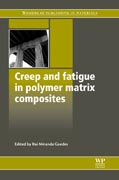
Creep is the tendency of materials to deform when subjected to long-term stress, particularly when exposed to heat. Fatigue is the damage that occurs when a material is subjected to cyclic loading. Both are critical factors in the long-term performance and reliability of materials such as polymer matrix composites which are often exposed to these types of stress in civil engineering andother applications. This important book reviews the latest research in modelling and predicting creep and fatigue in polymer matrix composites. The first part of the book reviews the modelling of viscoelastic and viscoplastic behaviour as a way of predicting performance and service life. Part two discusses techniques for modelling creep rupture and failure. The final part of the book discusses ways of testing and predicting long-term creep and fatigue in polymer matrix composites. With its distinguished editor and international team of contributors, Creep and fatigue in polymer matrix composites is a standard reference for all those researching and using polymer matrix composites in such areas as civil engineering. Dr Rui Miranda Guedes works within the Faculty of Engineering at the University of Porto, Portugal. Dr Guedes has an international reputation for his research on creep and fatigue in polymer matrix composites. INDICE: Part 1 Viscoelastic and viscoplastic modelling: Viscoelastic constitutive modeling of creep and stress relaxation in polymers and polymer matrixcomposites; Timetemperature- age superposition principle for predicting long-term response of linear viscoelastic materials; Time-dependent behaviour of active/intelligent polymer matrix composites incorporating piezoceramic fibers; Predicting the elasticviscoplastic and creep behaviour of polymer matrix composites using the homogenization theory; Measuring fiber strain and creep behaviour in polymer matrix composites using Raman spectroscopy; Predicting the viscoelastic behaviour of polymer nanocomposites; Constitutive modelling of viscoplastic deformation of polymer matrix composites; Creep analysis of polymer matrix composites using viscoplastic models; Micromechanical modeling of viscoelastic behaviour of polymer matrix composites undergoing large deformations. Part 2 Creep rupture and damage interaction: Fiber bundle models for creep rupture analysis of polymer matrix composites; Micromechanical modelling of time-dependent failure in offaxis polymer matrix composites; Time-dependent failure criteria for lifetime prediction of polymer matrix composite structures; Characterization of vicoelasticity, viscoplasticity and damage in composites. Part 3 Fatigue modelling, characterisation and monitoring: Testing the fatigue strength of fibers used in fiber-reinforced composites using fiber bundle tests; Continuum damage mechanical modelling of creep damage and fatigue in polymer matrix composites; Accelerated testing methodology for predicting long-term creep and fatigue in polymer matrix composites; Fatigue testing methods for polymer matrix composites; The effect of viscoelasticity on fatigue behavior of polymer matrix composites.
- ISBN: 978-1-84569-656-6
- Editorial: Woodhead
- Encuadernacion: Cartoné
- Páginas: 500
- Fecha Publicación: 01/09/2010
- Nº Volúmenes: 1
- Idioma: Inglés
